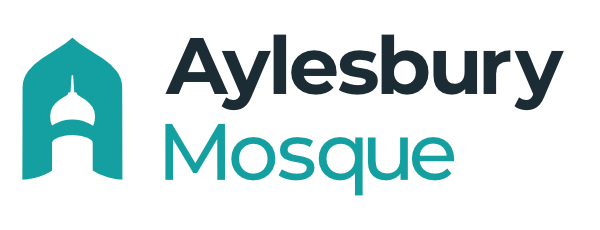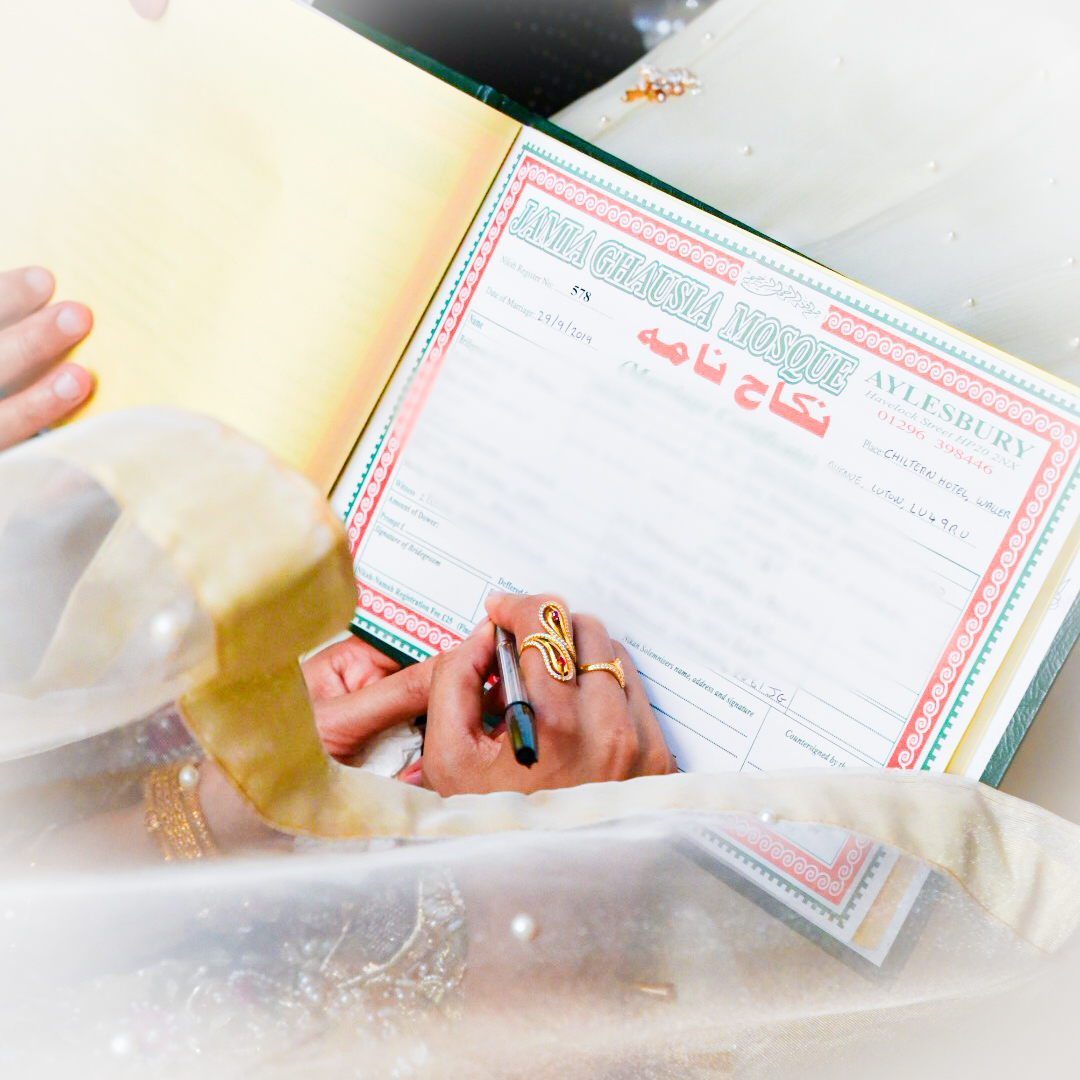Nikah Services
Marriage is a hugely rewarding act of worship and a great sunnah of the Prophet ﷺ and family life is the foundation of a successful society, and marriage is an occasion of great joy in the Muslim community.
Aylesbury Mosque offers Nikah services to couples who wish to get married in accordance with Islamic tradition.
Nikah Requirements
- Documents: Valid photo ID (passport / driving licence) and proof of address for Bride and Groom.
- New Muslims: Conversation Certificate for new Muslims.
- Witnesses: Presence of two Muslim Male witnesses, with their ID’s.
- Wali: Bride’s Wali (guardian) or Wakeel (attorney) to be present.
- Divorced: If any one or both of the couple were previously divorced, we will require the Islamic certificate of divorce.
- Nikah Fees: See section below for details
- Age: Bride and Groom to be aged 18 years and over – this is now a legal requirement in the UK and is a criminal offence otherwise.
Additional Information
- Nikah Certificates – Aylesbury Mosque will only issue one original certificate to the couple.
- Video Call/Telephone – Aylesbury Mosque WILL NOT conduct a Nikah that is not in-person.
- Polygamy – The law in the UK does not recognise polygamous marriages.
- Civil Marriage Registry – A Nikah, as conducted by an imam, is not considered a civil marriage without an official civil registry. You can register your marriage through the Civil process with the local registrar.
Nikah Fees
- Nikah performed at the Mosque: £50
- Nikah performed in Aylesbury but at an alternative location £75
- Nikah outside Aylesbury £125 + £25 per hour over and above 2 hours (includes travel time).
Bookings for nikah must be made at least two weeks before the nikah date.
All fees are a donation towards the administration of the nikah, the imam’s time, support of and contribution to the running costs of the mosque. If the family wishes to make a gift to the Imam performing the nikah, that is purely at their discretion.
Payment must be made directly to the Mosque prior to the nikah ceremony, either by bank transfer or in cash to the Management team who will issue you a receipt accordingly. Imams are not authorised to receive the nikah fees.
If paying by bank transfer, use reference: Nikah <name of bride or groom>
Bank details are as follows:
Name: Aylesbury Mosque
Sort Code: 30-90-38
Account Number: 00995110
Frequently Asked Nikah Questions
How do we book a nikah ceremony?
Fill out the online booking form using the button above.
What is a Mahr?
The Mahr, a prophetic tradition, is a gift that is given by the husband to the bride which becomes her sole property and cannot be taken back.
What documentation do we need for the nikah?
Proof of ID (Passport or Driving Licence) of the Bride, the Groom as well as witnesses must be submitted prior to the Nikah ceremony. Other documentation may also be required subject to the information provided on the nikah application.
How many witnesses are needed for the nikah ceremony?
According to Islamic law, a minimum of 2 male witnesses are necessary for a valid Nikah, or alternatively, 2 female and 1 male witness.
What is a Wali?
The Wali is a male guardian, usually a father or otherwise a brother or paternal uncle, whose role it is to ensure that the marriage the bride is entering upon is in her best interests and that the marriage contract ensures that she be treated fairly.
What is a Wakil?
In the event that the bride does not have a Wali, a Wakil can be appointed as a representative or a Trustee to receive her consent of marriage. As an example, if someone is a convert, they can choose for the Imam to be the Wakil.
Can I have a nikah wihtout having a wali or a wakil?
Though highly recommended as a protective measure for the bride, it is not an absolute necessity for the bride to have a Wali or Wakil in order to have an Nikah.
What language will the nikah be conducted in?
We offer both Urdu and English. The formal parts of the ceremony that need to be said in Arabic will also be translated into English or Urdu by the Imam to ensure the bride, groom as well as guests have a full understanding of the proceedings.
Can a Muslim women marry a non-Muslim?
No.
Is our nikah certificate a legal document in UK law?
The Nikah certificate is purely an Islamic document and has no legal standing in UK Law. The Nikah certificate symbolises that a marriage has taken place between the bride and groom according to Islamic law and may be used in Islamic countries if necessary e.g. the couple attending Hajj together.
Do we require for the civil ceremony to take place before our nikah?
No, the Civil Ceremony does not need to take place prior to the Nikah though the Imam would like to know when a date has been arranged for the Ceremony to take place.
Can we conduct our civil ceremony at the mosque?
Aylesbury Mosque is not currently authorised by the local council to conduct civil ceremonies. To conduct a civil ceremony, this will have to be arranged with your local registrar. If you are resident in Buckinghamshire please call 01494 475092 to book an appointment.
For the marriage to be legally registered, you must ‘give notice’ at your local register office and arrange for the civil ceremony within 12 months of giving notice.
Can we hold a nikah reception at the mosque?
Ordinarily, the masjid does not provide this service and we would recommend an alternative venue to entertain your guests. The masjid does not have catering facilities and there are classes and other activities that are going on that we do not want to disrupt.
What happens in the nikah ceremony?
- The Nikah ceremony will begin with a Qur’an recitation and if you have any particular ayahs you would like recited, you are more than welcome to make a request.
- The ceremony will then continue with a short talk by the Imam on the significance of marriage in Islam with citations made from the Qur’an and Hadith.
- The Imam will then proceed to give a Khutbah as given by the Prophet Muhammad (Peace be upon him) when he conducted Nikah ceremonies.
- The Ijab (proposal of marriage) and qabul (acceptance of marriage) will then be made between the groom and the Wali or Bride.
- The couple may then exchange vows in English – The Imam will ask the groom to repeat the vow after him, and thereafter, the bride will also be asked to do the same.
- The couple have officially entered upon wedlock according to Islamic Law and the Imam will then make a dua to conclude the ceremony.
- Once the ceremony has concluded, the nikah certificate will be signed by the Bride, Groom, Imam & witnesses.

